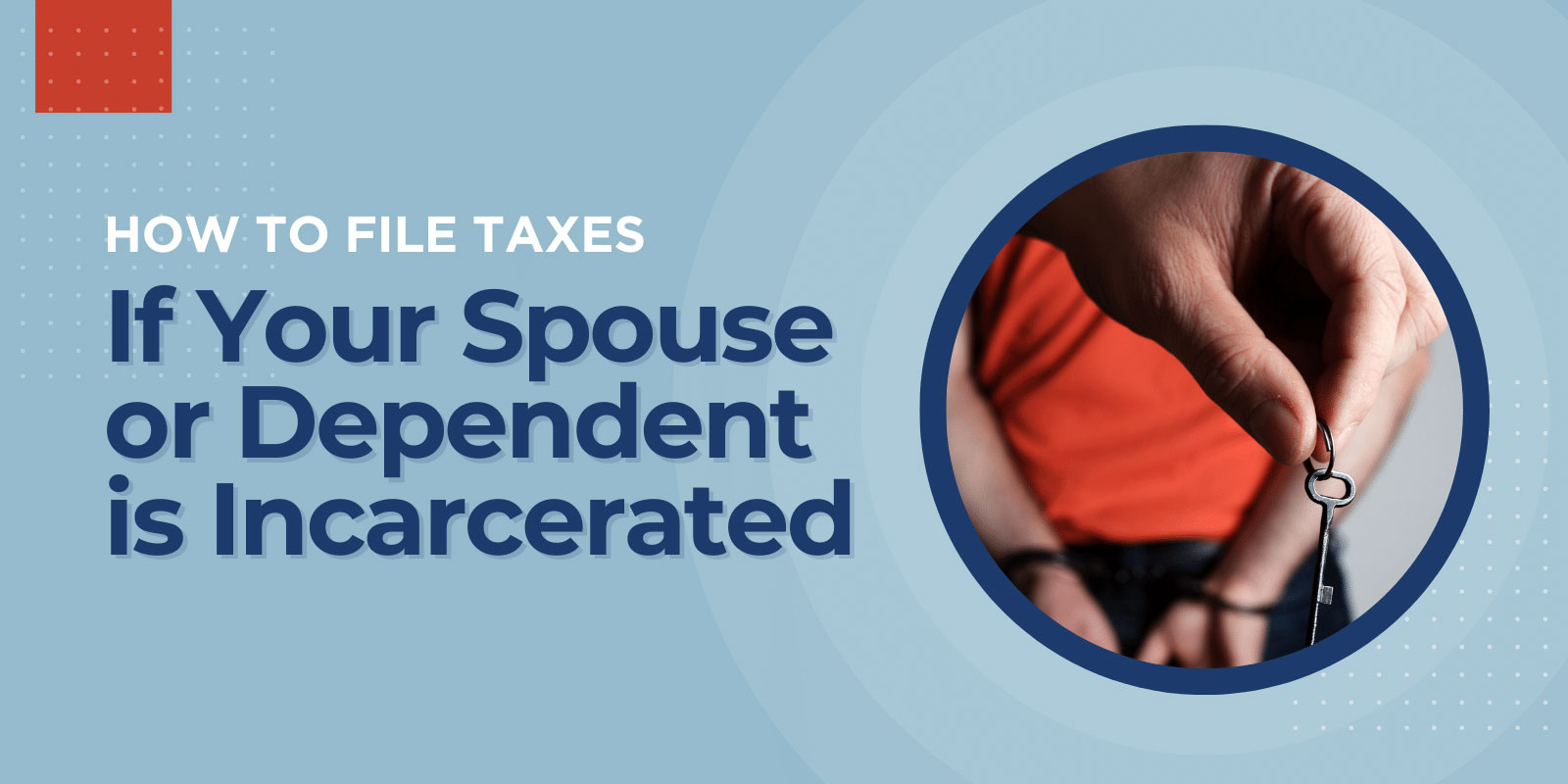Filing taxes can be a complex process, and it becomes even more challenging when your spouse or dependent is incarcerated. In such situations, various considerations and adjustments must be made to ensure accurate and lawful tax filings. This article will guide you through the process, providing valuable information and tips on how to file taxes if your spouse or dependent is incarcerated.
Determine Filing Status
The first step in filing taxes when a spouse or dependent is incarcerated is to determine your filing status. When a spouse or dependent is incarcerated, your tax filing obligations continue. The IRS doesn’t provide special exemptions solely based on incarceration, but there are important considerations that affect how you file and what benefits you may claim. If you are legally married, you typically have the option to file jointly or separately. Additionally, if you have a qualifying child, you can file as head of household.
Married Filing Jointly
The IRS considers married couples to be still married even when one spouse is incarcerated. As in more common tax situations, the married filing jointly status will provide the most tax benefits. For example, if your spouse does not earn income while imprisoned, your total taxable income will be lower and then further reduced by joint tax deductions. However, keep in mind that if you do file jointly, you may need to have a power of attorney to prepare, sign, and file your tax return on your spouse’s behalf.
There may be a scenario in which your spouse does earn income while in prison. If this is the case, you still need to report that income on your tax return. Even if your spouse was paid with non-cash income, such as commissary credits, the value of the credit needs to be counted as income. One important thing to note, however, is that your incarcerated spouse’s income, whether it be cash or non-cash payments, does not qualify as earned income. This includes any payments accepted while in a work release program or while living in a halfway house. This is important for those who claim the Child Tax Credit (CTC) or the Earned Income Tax Credit (EITC).
Married Filing Separately
Filing separately from your spouse may be preferred if you want to be responsible only for your own tax liability. However, this status typically results in higher tax rates and makes you ineligible for certain credits and deductions.
Head of Household
As previously mentioned, you may be able to file as head of household if you have a qualifying child or dependent. However, if you are married, you can only do this if you and your spouse did not live together in the last six months. Typically, you may not count your incarcerated spouse as a dependent. You can, however, if you provided over 50% of their support for that year. In this specific scenario, this would include mounts spent on:
- Legal expenses related to the incarceration
You’ll need to provide supporting documentation, such as commissary account statements, money transfer receipts, prison work program earnings statements, and medical expense receipts.
If the person incarcerated is your dependent, like a qualified child or relative, you might be able to claim head of household. To qualify as a child, they must:
- Be under age 19, a full-time student under age 24, or permanently and totally disabled;
- Not provide more than 50% of their own total support; and
- Live with you for more than 50% of the year.
If the imprisoned person is another family member or dependent, they must:
- Not provide more than 50% of their own total support; and
- Not be someone else’s qualifying child or dependent; and
- Not earn more $5,200 in 2025
Note that according to the IRS, temporary absences for special circumstances are permitted. This includes the incarceration of the child or dependent at a juvenile facility.
Tax Credits and Deductions
Explore available tax credits and deductions that may apply to your situation. For example, you may be eligible for the Child Tax Credit, Earned Income Tax Credit (EITC), or other credits depending on your circumstances. Understanding these options can help maximize your tax savings.
Child Tax Credit
You may still claim the Child Tax Credit for qualifying children, even if their other parent is incarcerated. Requirements include:
- The child must live with you for more than half the year
- You must provide more than half of the child’s support
- The child must be under 17 at the end of the tax year
Earned Income Tax Credit (EITC)
- The imprisonment of a spouse can affect EITC eligibility:
- If filing as Head of Household, your income alone determines eligibility
- Prison work program earnings generally don’t count toward earned income requirements
- You must have qualifying children living with you for more than half the year
Other Deductions
Many people in this situation ask if the money they send to their imprisoned spouse or dependent is tax deductible. The answer to this question is no. You cannot deduct any donations sent to a single person. This includes any fundraising money that might’ve been collected to fight a wrongful conviction case. Any qualified donations must be made to an IRS-approved 501(c)(3) organization.
Again, you may deduct qualifying medical expenses paid for an incarcerated spouse or dependent. However, the expenses must:
- Must exceed 7.5% of adjusted gross income
- Include expenses not covered by the correctional facility
- Require documentation from the medical provider
You may also deduct most legal fees related to incarceration are not tax-deductible, except:
- Fees related to generating taxable income
- Certain business-related legal expenses
Income Reporting for the Incarcerated
Understanding how to handle income earned by an incarcerated individual is crucial for ensuring compliance with tax laws and avoiding penalties.
Reporting Income Earned Before or During Incarceration
An incarcerated individual may still have taxable income from before or during their incarceration, such as wages, royalties, or other sources. This income must be reported on their tax return.
Handling Prison Wages
Wages earned in prison are generally subject to federal income tax. If your incarcerated spouse earns income through a prison work program, their wages should be reported on their tax return. However, amounts under the standard deduction typically do not require filing. In 2025, this amount is $15,000. If you are assisting with the tax preparation of your incarcerated spouse or dependent, the correctional facility should be able to provide the inmate’s W2 or 1099-MISC tax form.
Financial Support and Commissary Accounts
Money sent to an incarcerated person’s commissary account is not tax-deductible for the sender, nor is it considered taxable income for the recipient. However, it should be documented if you plan to claim the inmate as a dependent. You will need these receipts to confirm you meet the support requirements.
Documentation and Communication Tips
Filing taxes when your spouse or dependent is incarcerated requires additional documentation and clear communication.
Required Forms and Documentation
- Form 2848, Power of Attorney: This form allows you to represent your spouse in tax matters.
- Proof of Dependency: Gather records like birth certificates, financial support receipts, and court documents if claiming an incarcerated dependent.
Handling Communication with the Incarcerated Spouse
Maintaining contact with an incarcerated spouse or dependent about tax matters can be difficult. Plan ahead by:
- Establishing access to financial records.
- Coordinating with prison staff for necessary document exchanges.
Common Mistakes to Avoid
Filing taxes in this situation can be error-prone. Here are some common mistakes and how to avoid them.
Errors in Filing Status Selection
Choosing the wrong filing status can lead to penalties or missed benefits. Review IRS guidelines or consult a tax professional to ensure accuracy. Filing jointly with your incarcerated spouse will be the most beneficial status. If you don’t qualify for this status, be sure to consider Head of Household if you are eligible as this is often overlooked.
Income Reporting Mistakes
Ensure all income earned by the incarcerated individual is accurately reported. Be transparent about the situation when filing. This means including pre-incarceration income and prison work program earnings and excluding commissary deposits.
Overlooking Credits or Deductions
Don’t assume incarceration disqualifies you from all benefits. Research or seek advice on which credits and deductions still apply. However, if you do claim deductions or credits, be sure to include supporting documentation. Keep all tax-related documents for at least three years from the filing date or two years from when the tax was paid, whichever is later.
Seek Professional Assistance
Filing taxes when your spouse or dependent is incarcerated requires careful consideration and a thorough understanding of tax laws. By following these steps and seeking professional advice, you can navigate the complexities of tax filing and ensure compliance while maximizing potential benefits. Remember to stay organized, gather all necessary documentation, and approach the process with diligence to achieve a smooth tax filing experience.
When to Consult a Tax Professional or Attorney
If you’re unsure about how to proceed or face complicated issues like joint liabilities or unreported income, consider consulting:
- Tax Attorneys: For legal guidance on complex cases.
- Tax Preparers: For assistance with documentation and filing.
Several organizations offer free tax preparation help including:
- Tax Counseling for the Elderly (TCE)
- Legal aid organizations
Tax Help for Those with Incarcerated Spouses and Dependents
Filing taxes with an incarcerated spouse or dependent requires careful attention to detail and thorough documentation. Understanding your filing status options, maintaining proper records, and seeking professional help when needed can help ensure compliance and maximize available tax benefits. Remember that each situation is unique, and consulting with a tax professional familiar with incarceration cases can provide valuable guidance for your specific circumstances. Optima Tax Relief is the nation’s leading tax resolution firm with over $3 billion in resolved tax liabilities.
If You Need Tax Help, Contact Us Today for a Free Consultation
Publisher: Source link











